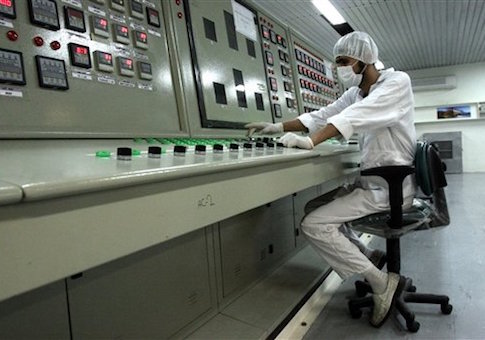Russia and Iran are beginning to trade sensitive nuclear materials, an activity that is at least in part condoned by the Obama administration and permissible under the tenets of the recent nuclear accord, according to U.S. and Iranian officials.
Russian-made yellow cake, a type of uranium powder that helps turn it into a nuclear fuel, "is in Iran and Iran’s enriched uranium cargo will be sent to Russia" within the next several days, according to top Iranian officials quoted this week in the country’s state-run press.
Senior U.S. officials confirmed on Thursday that the Obama administration backs the opening of commercial nuclear trade between Moscow and Tehran.
"Commercial contracts are in place for Iran to ship its enriched uranium stockpiles to Russia," Stephen Mull, a State Department official who is leading the administration’s charge to implement the nuclear deal, told lawmakers.
"We expect that this material, about 25,000 pounds of … low enriched uranium, will leave Iran in the coming weeks" and make its way to Russia, according to Mull.
This trade is permitted under the parameters of the nuclear agreement, according to Mull and other U.S. officials who testified before Congress on Thursday.
Iranian officials say that they intend to send up to nine tons of enriched uranium to the Russians in exchange for yellow cake powder.
"The yellow cake cargo has been imported and is in [the city of] Isfahan (now) and Iran’s enriched uranium will be loaded into a Russian ship in coming days and will be delivered to that country," Ali Akbar Salehi, the head of Iran’s atomic energy organization, told Iranian reporters on Wednesday.
Iran has further vowed to commercialize its nuclear technology once the deal is implemented.
Meanwhile, U.S. officials detailed plans to create a "procurement channel" by which Iran can obtain nuclear technology and other related materials.
The nuclear agreement allows for the "creation of a procurement channel that can meet the limited, legitimate nuclear needs that Iran may have," Thomas Countryman, an assistant secretary of state in the Bureau Of International Security and Nonproliferation, told the Senate Foreign Relations Committee.
The National Nuclear Security Administration also will have a role in deciding what nuclear goods Iran may import going forward.
The nuclear accord "establishes a process for review and approval of procurement by Iran of specified nuclear related items," according to retired Lt. Col. Frank Klotz, an undersecretary for nuclear security at the Department of Energy.
Elements within the nuclear security administration also will aid in this process, Klotz said.
As Iran prepares to ship large quantities of its nuclear stockpile to Russia, it has doubled down on the development of intercontinental ballistic missile technology, which historically has been used to carry a nuclear payload.
Iran’s defense minister, Hossein Dehqan, maintained on Wednesday that Iran will "continue developing its missile and weapons industries" even though this behavior violates United Nations Security Council resolutions.
"Since day one of the endorsement of the [nuclear agreement], our different tests have not postponed even for a single day, hour or moment," Dehqan said. "Rather we have not even felt any doubt about declaring them."
The Obama administration has come under intense criticism for its failure to take action against Iran in the wake of its second ballistic missile test since the deal was signed.
"The agreement is off to a really terrible start," Sen. Bob Corker (R., Tenn.), chairman of the Senate Foreign Relations Committee, said during Thursday’s hearing. "We see no evidence of [Iran] paying a price for any of these actions."
Mull, the State Department official, maintained that Iran is going to continue its missile tests no matter what action the administration takes or does not take
"Iran is going to develop that program regardless of the consequences it’s paid for that," he said, explaining that the Obama administration’s goal is to remove the nuclear issue from the equation.
Mull further noted that while Iran’s missile tests violate U.N. resolutions, they do not violate the nuclear deal.
When pressed by senators to explain whether the administration will take any concrete action against Iran in response to its rogue behavior, Mull said that officials are "actively considering additional measures at this moment."
